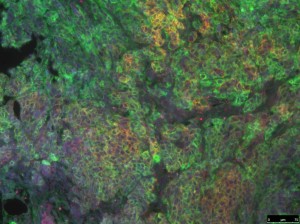The CD44 Proteins Induce Pancreatic Cancer Metastasis?
Pancreatic cancer is a highly malignant gastrointestinal cancer that is difficult to be diagnosed and treated due to its rapid metastatic spread. Approximately 90% of this type of cancer is originated in the glandular epithelium of ductal adenocarcinoma. Its incidence and mortality has increased significantly in recent years, with 5-year survival rate less than <1%, becoming one of the most aggressive types of cancer.
Recently, a group of researchers at Karlsruhe Institute of Technology(KIT) publish their new study result—Inhibition of Tumor Growth and Metastasis in Pancreatic Cancer Models by interference with CD44v6 Signaling in journal Gastroenterology, and establish the basis for new treatment for pancreatic cancer. In this study, they reported that in various different pancreatic cancer mouse models, the CD44v6-specific peptides not only inhibited the spread of tumor cells, but might even lead to the regression of already existing metastases.
[caption id="attachment_304" align="alignleft" width="300"] Cells of a pancreatic tumor: Yellow areas show the co-localization of c-Met and CD44v6 proteins. (Photo: ITG/KIT)[/caption]
Cells of a pancreatic tumor: Yellow areas show the co-localization of c-Met and CD44v6 proteins. (Photo: ITG/KIT)[/caption]
Véronique Orian-Rousseau, Institute of Toxicology and Genetics of KIT, believes that these peptides have a high potential for tumor therapy, particularly for the treatment of pancreatic cancer with its aggressive metastases.
CD44v6 protein, discovered by the KIT in the 1990s, is a co-receptor for so-called receptor tyrosine kinase, e.g. MET or VEGFR-2, that depend on CD44 for their activation. These enzymes affect tumor cell activities to a large extent: MET can promote their abilities for proliferation, migration and invasion; VEGFR-2 can promote angiogenesis, i.e. the formation of new blood vessels required to supply the tumor. Thus, they play a decisive role in the growth and spread of tumor cells.
In pre-clinical studies on animals, KIT scientists used different pancreatic cancer models, and firstly proved the co-receptor function of CD44v6 that drives the metastatic spread of cancer. Interestingly, they found that small protein fragments (called v6pep) of CD44v6 successfully inhibited cancer metastasis in animal experiments. They thought that they could interfere with a three-dimensional protein structure of CD44v6 and then inactivated it in this way. Animal tumor treatment with this peptide could lead to a reduction of tumor burden and to the inhibition of metastasis. In addition, the existing metastases regressed or disappeared completely.
In animal experiments, survival time had a significant increase. The researchers found that, v6pep peptides were more effective than crizotinib and Pazopanib, and the latter two were against MET and VEGFR2 tyrosine kinase respectively. The evaluation of data on patients with pancreatic cancer shows that metastasis and shorter survival time connects with an increased level of CD44v6 and MET.
This means we’ve made an important step in basic research that will help the development of anticancer drugs. At the end of 2016, the researchers will also conduct clinical research on amcure GmbH with KIT to reveal whether the peptides will be effective in human patients.
Reference:
Inhibition of Tumor Growth and Metastasis in Pancreatic Cancer Models by interference with CD44v6 Signaling. Gastroenterology, 2015;

Your email address will not be published. Required fields are marked *